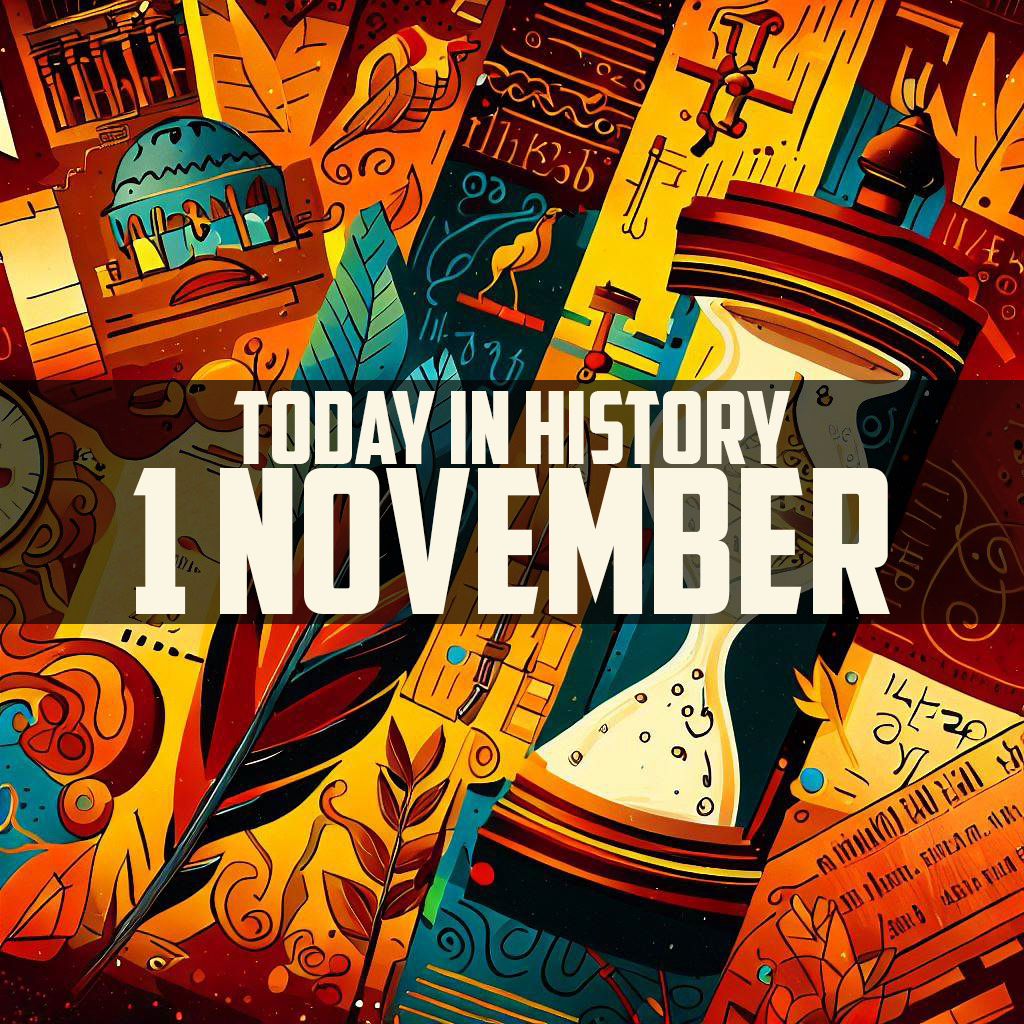The transition from October to November has been marked by a plethora of significant events throughout history. As with every day on the calendar, November 1st has seen events that have influenced the course of history, politics, science, art, and culture. This article seeks to shine a light on some of these pivotal moments.
Today in History: 1 November

1. All Saints’ Day (Christianity) – A Universal Celebration:
November 1st is traditionally known as All Saints’ Day in the Christian calendar. It’s a day dedicated to all the saints, particularly those who do not have their own special feast day. Originating in the early Christian Church as a day to honour martyrs, its scope expanded to include all saints by the 9th century. All Saints’ Day is a public holiday in many countries and is celebrated with church services, lighting candles on graves, and other ceremonies.
2. 1512 – The Sistine Chapel Ceiling Opens to the Public:
One of the most iconic pieces of art in history, the Sistine Chapel ceiling painted by Michelangelo, was exhibited to the public for the first time on November 1, 1512. Commissioned by Pope Julius II and painted between 1508 and 1512, the artwork covers an area of 5,700 square feet and includes more than 300 figures, with the most famous portion being ‘The Creation of Adam’. Michelangelo’s achievement set a new standard for Western art and continues to inspire artists worldwide.
3. 1604 – William Shakespeare’s “Othello” is Performed for the First Time:
On November 1, 1604, William Shakespeare’s tragedy “Othello” was presented for the first time at Whitehall Palace in London. The play, known for its exploration of themes like jealousy, racism, betrayal, and repentance, has become a classic of English literature and is still widely performed around the globe.
4. 1755 – The Lisbon Earthquake:
One of the deadliest earthquakes in history struck Lisbon, Portugal on November 1, 1755. Estimated to be between 8.5 and 9.0 on the Richter scale, it was followed by a tsunami and fires that razed the city to the ground, killing tens of thousands of people. This disaster significantly impacted European art, philosophy, and theology, leading to questions about God’s benevolence and the problem of evil.
5. 1848 – First Women’s Medical School Opens:
The Boston Female Medical School, which would later merge with the Boston University School of Medicine, opened its doors on November 1, 1848. It was the first medical school established specifically to educate women and played a crucial role in breaking gender barriers in the field of medicine.
6. 1896 – The Establishment of the International Olympic Committee:
November 1 witnessed the foundation of the International Olympic Committee (IOC) in 1896. This was a significant step in reviving the ancient Greek tradition of the Olympic games, leading to the establishment of the modern Olympic Games.
7. 1938 – Seabiscuit Beats War Admiral: In a legendary horse race on November 1, 1938, Seabiscuit defeated the Triple Crown winner, War Admiral, at Pimlico Race Course in Baltimore. This event was more than just a race; it was a symbolic moment in American sports history, signifying hope during the Great Depression era.
8. 1952 – The United States Tests the First Hydrogen Bomb:
The world entered a new era of nuclear weapons when the United States detonated the first hydrogen bomb on November 1, 1952, in the Marshall Islands. This event intensified the arms race during the Cold War era.
9. 1968 – The Motion Picture Association of America Introduces the Film Rating System:
To provide viewers with content warnings and to replace the restrictive Hays Code, the Motion Picture Association of America (MPAA) implemented a film-rating system on November 1, 1968. This system, though revised over the years, still remains in place.
10. 1982 – The Honda Accord Becomes the First Japanese Car Produced in the U.S.:
On November 1, 1982, the Marysville Auto Plant in Ohio produced the first Honda Accord, marking a significant shift in the global automobile industry.

In Conclusion:
November 1st stands out not only for the breadth of history it encompasses but also for the depth of impact each event has had on shaping our world. From the realms of art and literature to geopolitics and natural calamities, this day reminds us of the intricate tapestry of events that have forged the path of human progress and civilization.
